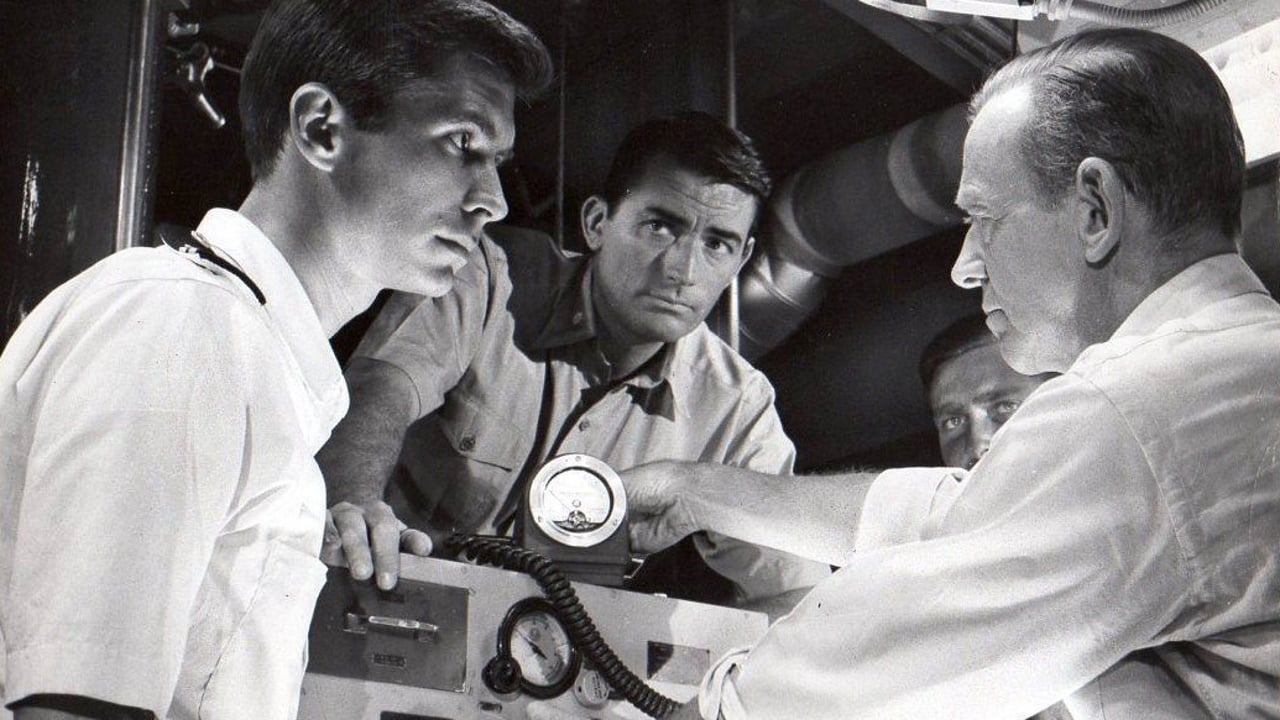nospam-996-435993
At first I thought this movie was going to be an anti-war movie with over 2 hrs of propaganda, boy was I wrong! For those a little hard of hearing it may be difficult without closed captions to follow, since there is an Australian accent. First, study up on how the book differs from the movie and you will see that the movie would suffer if it followed the book. Because the movie blames no individual nation the opening viewing was shown in China, Mosco and other nations not friendly with the USA at the time. What I found unique is how I became part of all the characters. I'm still somewhat shocked by watching this film, it grips your humanity like no other film I've ever watched. If you are a husband/wife/parent it will probably rip at your emotions and you will examine yourself and your relationships and start to wonder why you take your loved ones and neighbors for granted. I give this move a STRONG 10 and may buy the DVD, its that good.
Spikeopath
Stanley Kramer and John Paxton adapt from Nevil Shute's novel. Gregory Peck, Ava Gardner, Fred Astaire, Anthony Perkins and Donna Anderson star, with music by Ernest Gold and cinematography by Giuseppe Rotunno.After a global nuclear war, the inhabitants of Australia realise that the radiation clouds are heading their way. A group of people try to come to terms with this fact.A well regarded film by the critics, and lauded by the makers at the time as an important and potent piece of cinema, On the Beach is still a film that's not for everyone.The star appeal holds weight, though much of the narrative is tired and weary, trite and cheesy. In fact Shute himself was less than happy with what Kramer made of his literary source, the director in his element with a message movie.If it was Kramer's intent to make the viewers also feel like what it's like waiting for death? Then he achieved it, while Gold's overuse of Waltzing Matilda in his musical score also ends up boring the senses. 4/10
tieman64
Stanley Kramer is to subtlety what Satan is to decency. In "On the Beach", Kramer uses all his powers of stating-the-obvious to inform us that nuclear weapons are bad. Real bad.Glossy, immaculate and straining to be "prestigous", "On the Beach" opens with most of planet Earth already decimated. Following an accidentally triggered nuclear war between the United States and the Soviet Union, humanity's survivors congregate in the southern hemisphere. Here they slowly die; radiation is killing off man's last vestiges.At its best, "On the Beach" boasts an unusual premise, a palatable sense of doom, several haunting sequences evocative of early Antonioni ("Red Desert", "Eclipse") and a fine performance by the soon-to-be forever typecast Anthony Perkins. It also embodies all of Kramer's worst qualities. It is self-righteous, self-congratulatory, hides banal platitudes behind an air of faux "sophistication" and, like most of Kramer's films, believes that "serious subject matter" is inherently "more artistic". Like Steven Spielberg, Kramer makes hokey "serious movies" which mostly miss the points of the topics they're "about". There's also something tasteless about such a self-pitying film aimed at the only nation to ever actually use nukes on human beings."The trouble is, you want a simple answer!" a character in "Beach" states, before providing a simple explanation as to why nuclear weapons are bad news. "Everybody had an atomic bomb, and counter-bombs, and counter-counter bombs! The devices outgrew us; we couldn't control them! Somewhere, some poor bloke probably looked at a radar screen and thought he saw something. He knew that if he hesitated for a second that his own country would be wiped off the map. So he pushed a button and the world went crazy!" In one sense, the character is right. Nukes and nuclear arms races are stupid. But the whole race to build nukes stemmed from old fashioned, early 20th century Imperialism. This accelerated in the 1940s. Here, the British Admiralty, America, Germany, France and later Russia, all began designing neo-weapons so as to maintain their colonies, maintain their Imperialist designs and counter the weapons of their foes. World War 2, of course, then ended with Japan nuked, India and Pakistan split (both would become nuclear powers), Israel born (a nuclear power), France, the US and Britain victorious (all nuclear powers), Russia barricaded and Germany and her Allies crushed. The victors of this conflict then set about looting the planet, making more nukes and conquering the Third World. They also forced upon the weaker nations conditions which prevented them from creating nukes or indeed even conventional armies. This was all sold as "benevolent policing", but really marked a shift into a new form of colonialism.But the point is: the imperialism which ushers the creation of nukes is also achieved without nukes, today the possession of nukes protects smaller nations from imperialism (no country with nuclear weapons has ever suffered a serious attack), and the imperialism spurring the creation of nukes already does more damage than the damage caused by nukes themselves (humans are already dying, for example, to poverty related starvation at the rate of one atomic bomb being dropped on a densely populated area every 3 days)."On the Beach" is specifically about a nuclear slugging match between the United States and the USSR. In real life, Russia developed her first nukes in '49, four years after the US nuked Japan. This bombing has been rationalised as "humane" and "necessary", but everyone in command at the time stated otherwise. "Japan was already defeated and dropping the bomb was completely unnecessary," Dwight Eisenhower, Supreme Commander of the Allied Forces, outright stated. "The Japanese position was hopeless even before the first atomic bomb fell," Henry Arnold, Commanding General of the USAF would say. Making this equally explicit was Admiral William D. Leahy, Chief of Staff to President Truman, who said, "The use of the atomic bombs at Hiroshima and Nagasaki were of no material assistance in our war against Japan. The Japanese were already defeated and ready to surrender." And Admiral Chester Nimitiz, Commander in Chief of the US Pacific Fleet: "The Japanese had, in fact, already sued for peace. The atomic bomb played no decisive part, from a purely military point of view, in the defeat of Japan." The US' own Strategic Bombing Survey report would say: "Prior to 31 December 1945, and in all probability prior to 1 November 1945, Japan would have surrendered even if the atomic bombs had not been dropped." So why nuke Japan? Not for "protecting Americans" - most ventures by US military planners are known to decrease national security – but to freak out Russia and prevent it impeding Western neo-imperialist designs. Fast forward several decades, and both superpowers had become expert at using each other's nuclear arsenals as bogeymen to both rally their masses and rubber-stamp more naked exploitation. With regards to the United States, economist J. K Galbraith once called this "military Keynesianism": the creation of state-guaranteed markets for high technology waste (armaments), and the using of giant arsenals to leverage policies of intervention in other economies. If nuke wielding baddies didn't exist, the Pentagon would have to invent it, because you can't look good stealing crap if there aren't bogeymen on the block. Thanks to oil and grain shortages, various embargoes and debts to foreign creditors, the Soviet Union collapsed in the late 1980s. The Cold War thus ended without a nuclear kerfuffle. Today, no leader is likely to use nukes. In politics, public fallout over nuclear fallouts keeps fingers off red buttons. Ironically, if futurologists are correct in their belief that tomorrow's economies will require nuclear energy so as to maintain their insane, accelerating growth rates, then the nuclear fallouts of the future may prove to be even more insidious: slow, wide-spread and sold to you as being 'necessary' for your very survival.5/10 - Worth one viewing.
LeonLouisRicci
Nuclear War and the End of the World. Now there is a Depressing Thought. But there is Absolutely No Reason to make a Depressing (read detaching) Movie. The Point Can be Made with Drama and Dread, Chilling and Disturbing Images, and Thoughtful Dialog about the Why's and the Whatevers. But this is Certainly one that is Shallow and Dull with only a Modicum of Resonance and Even Less Intellect.Philosophy about Nuclear War and Humanities Propensity to Destroy is Almost Absent and in its Place We have Philosophies about Marital Infidelity and Suicide by way of a Kevorkian Escape from Pain. A Totally Misplaced Engagement. We are Dealing with Global Annihilation and the End of Human Existence, not Someone Deciding to Pull the Plug because of Cancer.There is so much to Consider in this Cold War Scenario and it is All Reduced to Soap Opera. This is one of the Most Overrated Movies of All Time that Attempts to be Meaningful about its Subject (a noble effort) and be Oh So Important. But why make it so Interpersonal. Sure Everybody has Someone They Care About and Everyone is Special. But this is a Global Scenario, not some sort of Last Backyard Barbecue of the Fifties.



 AD
AD




